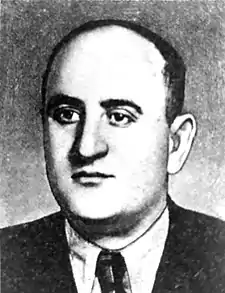Vakhtang Ananyan | |
|---|---|
 Vakhtang Ananyan on a 2006 Armenian stamp | |
| Born | 26 July 1905 |
| Died | 4 March 1980 (aged 74) |
| Nationality | Armenian |
| Occupation | writer |
Vakhtang Stepani Ananyan (Armenian: Վախթանգ Ստեփանի Անանյան, romanized: Vakht’ang Step’ani Ananyan; 26 July 1905 – 4 March 1980) was an Armenian writer and journalist. He wrote many works about hunting and Armenia's natural world.
Biography
Ananyan was born in the village of Poghoskilisa, near Dilijan (now within the city limits). He studied at Dilijan's parish school. In 1926, he moved to Yerevan, where he worked for the newspapers Machkal (Ploughman, 1930–31) and Sots’ialistakan gyughatntestut’yun (Socialist agriculture, 1931–1935). His first work was published in the journal Pioner in 1927. In 1935, he was the editor of the newspaper Kolkhoznik.[1] He fought in World War II and continued his journalistic and literary activities after the war.[2]
His first novel Krake oghaki mej (In the ring of fire) was published in 1930. Ananyan is known for his hunting stories and his realistic descriptions of Armenia's natural world.[2][1] Eight volumes of Ananyan's hunting stories were published in 1947–77 under the title Vorsordakan patmvatsk’ner (Hunting stories).[2] Among his well-known works are the book Vors (Hunt, 1934) and the novella Sevani ap’in (On the banks of Sevan, 1951). His work Hayastani kendanakan ashkharhë (Animals of Armenia, 5 volumes, 1961–75)[2] gives information about the animals that live or once lived in Armenia.[1] His works have been translated into more than two dozen languages,[2] including Russian, English, Chinese, Japanese, German, Czech, Bulgarian, Bengali, and Hindi.[1] His books Sevani ap’in and Hovazadzori gerinerë (Prisoners of Hovazadzor, 1936) were adapted into the films Ler’nayin lchi gaghtnik’ë (Secret of the mountain lake, 1954) and Hovazadzori gerinerë (1957), respectively. In 1970, he was awarded the State Prize of the Armenian SSR for his works written for children and youths.[1] He died in 1980 in Yerevan.[3] A high school in Dilijan is named after him.[4]
References
Citations
Works cited
- Bardakjian, Kevork B. (2000). A Reference Guide to Modern Armenian Literature, 1500–1920: With an Introductory History. Wayne State University Press. ISBN 9780814327470.
- Gyulnazaryan, Kh. (1975). "Ananyan Vakht'ang Step'ani". In Hambardzumyan, Viktor (ed.). Haykakan sovetakan hanragitaran [Armenian Soviet Encyclopedia] (in Armenian). Vol. 1. Yerevan. p. 365.
{{cite book}}: CS1 maint: location missing publisher (link) - "Vakhtang Ananyan". Writers.am. 2012. Archived from the original on 25 February 2013.
- "Dilijani V. Ananyani anvan mijnakarg dprots'" Դիլիջանի Վ.Անանյանի անվան միջնակարգ դպրոց [Dilijan Secondary School after V. Ananyan]. Dilijan.schoolsite.am. Archived from the original on 6 April 2022. Retrieved 8 September 2023.
Further reading
- Gyulnazaryan, Kh. (1963). Vakht’ang Ananyan Վախթանգ Անանյան (in Armenian). Yerevan: HSSR’ GA hrat. OCLC 35749827.
- Karapetyan, L. (1975). Vakht’ang Ananyani kanach’ ashkharhë Վախթանգ Անանյանի կանաչ աշխարհը [The green world of Vakhtang Ananyan] (in Armenian). Yerevan: Hayastan.
- Melyan, B. G. (2003). Girk’ë Vakht’ang Ananyani kyank’um Գիրքը Վախթանգ Անանյանի կյանքում [The book in Vakhtang Ananyan's life] (in Armenian). Yerevan: Girk’.
- Melyan, B. G. (1980). Vakht’ang Ananyan (matenagitut’yun) Վախթանգ Անանյան (մատենագիտություն) [Vakhtang Ananyan (bibliography)] (in Armenian). Yerevan: Yerevani hamalsarani hrat.
See also
External links
- Works by Vakhtang Ananyan on Grapaharan
- Works by Vakhtang Ananyan in the "Hay Girk" catalog of the National Library of Armenia